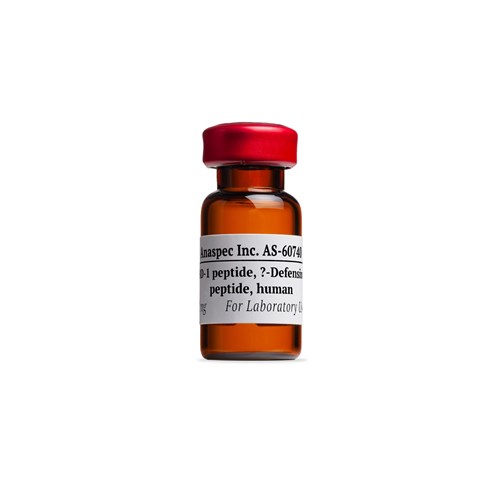LL-37 fragment (18-37) - 1 mg
- Cat.Number : AS-63712
- Manufacturer Ref. :
-
Availability :
In stock
Alternative choices
This is fragment 18-37 of LL-37, it exhibits enhanced antimicrobial activity. Antimicrobial peptide LL-37, belonging to the cathelicidin family, is the first amphipathic alpha-helical peptide isolated from human. It plays an important role in the first line of defense (innate immunity) against local infection and systemic invasion of pathogens at sites of inflammation and wounds.
Specifications
| Chemistry | |
| Sequence one letter code |
|
|---|---|
| Sequence three letter code |
|
| CAS registry number |
|
| Molecular Formula |
|
| Molecular Mass/ Weight |
|
| Modification | |
| Conjugation |
|
| Quantity & Purity | |
| Purity |
|
| Storage & stability | |
| Form |
|
| Storage Conditions |
|
| Activity | |
| Biomarker Target | |
| Research Area | |
| Sub-category Research Area | |
| Usage |
|
| Source | |
| Source / Species |
|
| Codes | |
| Code Nacres |
|
You may also be interested in the following product(s)

Citations
Decreased outer membrane permeability protects mycobacteria from killing by ubiquitin-derived peptides.
Mol Microbiol . 2009 Aug 06 ; 73(5) 844 | DOI : 10.1111/j.1365-2958.2009.06801.x.
- GE. Purdy
- et al
Neutrophil extracellular Trap–associated protein activation of the NLRP3 inflammasome is lnhanced in lupus macrophages.
J Immunol . 2012 Dec 24 ; 190(3) 1217 | DOI : 10.4049/jimmunol.1202388.
- JM. Kahlenberg
Clostridium difficile clinical isolates exhibit variable susceptibility and proteome alterations upon exposure to mammalian cationic antimicrobial peptides.
Anaerobe . 2012 Sep 24 ; 18(6) 614 | DOI : 10.1074/jbc.M110.206110
- R. McQuade
- et al
Hormonally active vitamin D3 (1α,25-Dihydroxycholecalciferol) triggers autophagy in human macrophages that inhibits HIV-1 infection.
JBC . 2011 Mar 30 ; 286(21) 18890 | DOI : 10.1074/jbc.M110.206110
- GR. Campbell
- SA. Spector
